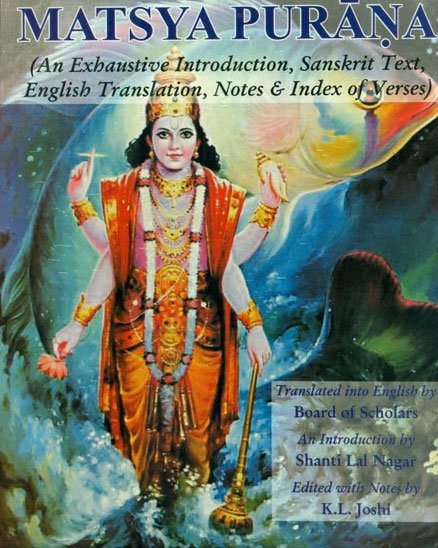The Matsya Purana (critical study)
by Kushal Kalita | 2018 | 74,766 words | ISBN-13: 9788171103058
This page relates ‘Anva Dynasty’ of the English study on the Matsya-purana: a Sanskrit text preserving ancient Indian traditions and legends written in over 14,000 metrical verses. In this study, the background and content of the Matsyapurana is outlined against the cultural history of ancient India in terms of religion, politics, geography and architectural aspects. It shows how the encyclopedic character causes the text to deal with almost all the aspects of human civilization.
Part 2.1l - The Anva Dynasty
Anu, the son of Yayāti was the founder of Anvas branch. King Anu had three sons viz.,
Sabhānara was blessed with a son Kolāhala. Kolāhala was the father of Sañjaya.[1] The later was succeeded by his son Purañjaya. The later was the father of Janmejaya who had a son named Mahāśāla. The descendants of Anu or Anvas rose to power under two able kings Mahāśāla and his son Mahāmanā. Mahāmanā was said to be the universal monarch and reigned in all seven continents.[2] Uśinara and Titikṣu were the two sons of Mahāmāna.[3] Under his two sons the Anavas divided themselves in two separate branches. One branch headed by Uśinara established separate kingdoms on the eastern border of the Panjab, which was divided among his five sons Nṛgu, Nava, Kṛśa, Suvrata and Śibi.[4] Pṛthudarbha, Suvīra, Kekaya and Bhadraka were the four sons of Śibi. Their reigning countries were named after them. Titikṣu was the father of Vṛṣadratha. Vṛṣadratha was the father of Sena.[5] Sena was the father of Sutapā. Sutapā had a son named Bali, who was the father of five sons, viz., Aṅga, Vaṅga, Suhma, Pundra and Kaliṅga[6] Aṅga, the son of Bali had a son named Dadhivāhana.[7] Dadhivāhana was succeeded by his son Diviratha.[8] Diviratha was the father of Dharmoratha, Dharmoratha of Citraratha, Citraratha of Satyaratha and Satyaratha was the father of Daśaratha. Daśaratha is also known as Lomapāda. Lomapāda was blessed with a daughter and a son, viz., Śāntā and Caturaṅga.[9] Pṛthulākṣa was the son of Caturaṅga.
Pṛthulākṣa was blessed with a son named Campaka. The country Campāpurī was named after him.[10] Campaka was succeeded by his son Pūrṇabhadra. Pūrṇabhadra begot Haryaṅga. Haryaṅga was the father of Vibhāṇḍa, Vibhāṇḍa was of Vāraṇa. Haryāṅga also had another son named Bhadraratha.[11] Bhadraratha begot Bṛhatkarma. Bṛhatkarma was the father of Bṛhatbhānu. The later was the father of Jayadratha, Jayadratha was the father of Bṛhadratha. The later was blessed with a son named Janmejaya who was a great conqueror.[12] Janmejaya was the father of Aṅga, Aṅga was of Karṇa, Karṇa of Vṛsasena, Vṛsasena was the father of Pṛthusena.[13]
Footnotes and references:
[1]:
Ibid., 48.10
[2]:
Ibid., 48.10-15
[3]:
Ibid.,48.15
[4]:
,48.17-18
[5]:
Ibid.,48.22
[6]:
Ibid., 48.24-25
[7]:
Ibid.,48.91
[8]:
Ibid., 48.92
[9]:
Ibid.,48.92-95
[10]:
Ibid., 48.96-97
[11]:
Ibid.,48.98-100
[12]:
Ibid.,48.101-102
[13]:
Ibid., 48.103
